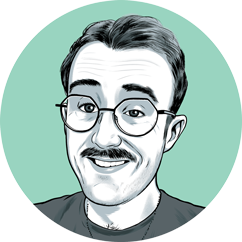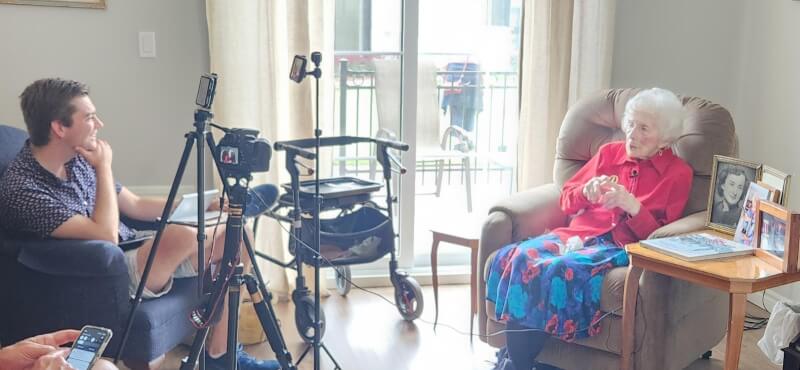“Kids these days …” goes the old trope, “they don’t care about what generations past did for them.” It might be the case for some, but not all. It’s likely not even the case for most. Few, however, demonstrate their respect quite like 25-year-old Zach Dunn.
For the last three years, the Toronto-based documentarian has interviewed almost 70 former military personnel from 10 countries, sharing their recollections with thousands via social media and YouTube. The compelling video series, “Global Veteran Stories,” was inspired by Dunn’s late grandparents, who both served in the Second World War. The young Canadian filmmaker has since honoured their legacy, having travelled across Ontario to sit down with the conflict’s last-living combatants, as well as those of Korea and Vietnam.
Dunn has interviewed veterans from the U.S., U.K., Poland, the Netherlands, the Czech Republic, Sri Lanka and beyond.
In a reversal of roles, Dunn spoke to Legion Magazine about his efforts.
About the motivations behind the projectMy grandad, John Lionel Williams, passed away when I was about three years old, so I didn’t ever get to hear any of his stories. He would have turned 104 last year.
Like many veterans, it was hard for him to talk about the war. I now know he enlisted at 18, around when Germany and the Soviet Union invaded Poland. He became a paratrooper with the British and fought in North Africa and Europe.
I did get the chance to interview my nanny, Alice Louise Williams, who passed away in October 2023 at age 96. She was in the British land army, joining at 15 after lying about her age.
So, it was my own family’s service, really, that inspired me to start the project in 2021. I’ve also always been interested and passionate about history, and it’s so important that we preserve and maintain these stories for the next generation.
About the veteran interviewees
The first interview [I did beyond family members] was incredible. Arnold Graham from Lakefield, Ont., is turning 100 this year. What I learned from that one was the selflessness of an individual. He enlisted at 17 after receiving his mother’s consent. The youngest of 12, he only wanted to join because six of his brothers were already fighting overseas, and he just wanted to get them home sooner.
Another interview that really resonated with me was that of Jim Parks of Mount Albert, Ont., who recently turned 100, but was 19 on D-Day on June 6, 1944. He was in the first wave of the landings when his landing craft hit a mine before reaching the beach. He then had to jump into the water and swim to shore.
Rex Arnett is another one that struck me. He was a wireless operator on a B-24 Liberator, carrying out 19 missions with his crew, but then missed a mission. The bomber, crew and his replacement were shot down that night.
Now, I started with World War Two veterans because of the family connection. But the Korean War, especially in Canada and the U.S., is never talked about. It’s the Forgotten War. I interviewed Glenn McCormack of Bath, Ont., who just turned 88. He was at the Battle of Hill 187, one of the bloodiest battles that Canada fought in the Korean War. He was 16 years old when he got bayonetted in the hand.
These kind of stories make you realize that we live in a pretty good time. I’m grateful every single day to be born and raised in a Canada full of opportunities, where people like me and younger need not go off in grade 11 or 12 and fight.
It’s really humbling to talk to these veterans because they went through so much and ask for so little. They don’t necessarily want the praise. They don’t want to be called a hero. But they deserve a voice, and I hope my project can help with that.
About social media engagement
Social media is such a powerful tool. I’ve interviewed about five veterans just from people seeing these videos on TikTok. The same goes for YouTube and Facebook.
It’s also amazing to see the high level of engagement I receive from many young people. Now, don’t get me wrong. I absolutely love history, and I love listening to these veterans, but it’s also exciting when I share them on social media and some of my videos get thousands of views, while others get 10,000 or 100,000 views.
The best thing about that is the response from users. I’ve had people say how cool this is, that they’re now going to take a history class or ask their grandparents about what it was like growing up at that time. I’m always glad to hear that.
About his work becoming an educational resource
I think how we connect with kids more is having these videos, these stories, shown in schools, as I’ve done on a number of occasions before. The sad reality is that our veterans are getting older and can’t travel as much as they used to. I really want to be a vessel to connect with history teachers as much as physically possible, having these videos playing during assemblies or even as part of a school history project.
Are kids going to watch five or six hours of interviews? Maybe not. But we can always see what they appear to be interested in by what they home in on.
Growing up with ADHD, I’m a big visual guy, so I like videos. I like learning in different ways. I’m probably not going to read many textbooks about history, I’m not going to lie, even though I’m trying to. And, of course, some of these school kids will probably feel the same way, so you must connect with how they learn.
About the importance of sustained veteran engagement
This is something I do on my weekends, with my time off. This is not my full-time job by any means. But we must make more time for veterans—it’s now or never.
I urge you and any family member reading this to be curious. Ask your family questions. You might not even know that a family member fought or served and that they have a story, as I didn’t realize my granddad served until I found his medals in my aunt’s house. You might not have the chance if you don’t act now because it’ll soon be too late, and those stories might be lost forever.
This abridged interview has been edited for brevity and clarity.
Advertisement
























